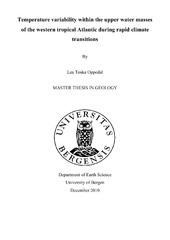Temperature variability within the upper water masses of the western tropical Atlantic during rapid climate transitions
Master thesis
Permanent lenke
https://hdl.handle.net/1956/5235Utgivelsesdato
2010-01-20Metadata
Vis full innførselSamlinger
- Department of Earth Science [1103]
Sammendrag
Rapid reorganization of the ocean circulation in the Atlantic Ocean has been linked to widespread varations in climate on both millennial and glacial-interglacial timescales. The response of the tropical Atlantic upper ocean to such circulation changes, has been investigated in both proxy studies and modelling experiments. It is believed that reduction of the thermohaline overturning leads to decreased cross-equatorial northward transport of warm surface waters. Consequently, heat accumulates in the upper water column of the tropical Atlantic. In this thesis, temperature variability within the upper water masses of the western tropical Atlantic is investigated in six timeslices associated with different modes of overturning circulation. The timeslices represent the Last Glacial Maximum, Heinrich event 1, Bølling-Allerød, the Younger Dryas and the early and late Holocene. Changes in the thermal stratification of the upper water column are inferred from stable oxygen isotope- and Mg/Ca measurements on five species of planktonic foraminfera that live vertically dispersed in the upper water masses. The proxy measurements provide evidence that more heat was stored in western tropical Atlantic waters during the Last Glacial Maximum when the thermohaline overturning was reduced. Heat was released in the present interglacial, which is associated with vigorous overturning. Concomitant to reductions in the overturning circulation, centred on the deglaciation, possible evidence is given that heat accumulated in the upper tropical water masses. However, on this scale, the results are not conclusive, and further investigation is needed.
